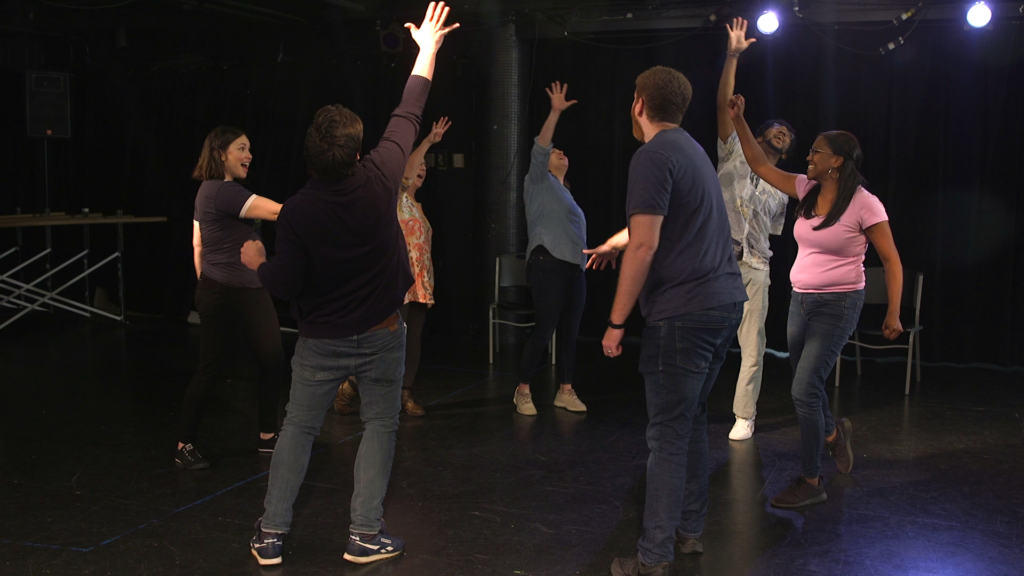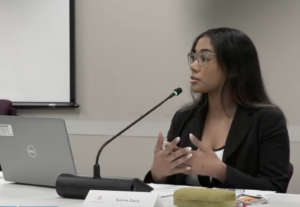
“Walk in the Light” is an upcoming animated short that tells the story of Raymond Washburn, a blind snack bar owner who saved five people during the 1993 Oklahoma City bombing. Washburn was a member of the Yuchi tribe, an indigenous nation native to both Oklahoma and Middle Tennessee. The short is being made in Nashville by independent filmmaker Princella Smith. She’s passionate about Raymond’s story and eager to share it.
“Some of his patrons were hollering, ‘I can’t see.’ Their vision was obstructed,” she explained. “So Raymond remembers that there’s a back stairwell. So he tells them, ‘Put your hands on each other’s shoulders and make a train and follow me. I’m going to lead us out of here.'”
In July 2023, Smith was awarded city funding from Metro Arts to finish her film.
“I needed new editing software on my computer,” she said. “And then, of course, you have to pay your team. I had to pay the animators. I have to pay a sound tech and, of course, had to pay for the person who scored the music. You pay studio fees.”
What is Thrive?
Metro Arts gives out city funding in two ways. There are operating grants, which support the day-to-day operations of arts organizations. There is also a program called Thrive, which funds projects by small nonprofits, plus independent artists like Smith.
Smith was part of Thrive’s biggest class by far in its 10-year history — with 101 recipients, up from 22 in 2022. Thrive was a key part of former Metro Arts Director Daniel Singh’s strategy for funding equity, since independent artists are less likely to be connected to Nashville’s biggest arts organizations and more likely to be people of color.
 Unscripted
Unscripted Unscripted is a small nonprofit dedicated to teaching Nashvillians about improv comedy. A one-time Thrive award helped them pay teaching artists for the first time.
Thrive is also a stepping stone for smaller arts organizations. Unscripted is a nonprofit that teaches Nashvillians about improv comedy. Its director, Emma Supica, says a one-time Thrive award helped her expand her presence in the community.
“Before it was all volunteer, all everything. So I was able to pay teaching artists,” she said. “It was absolutely an investment in improv in the community in Nashville, because … more people knew about this art form.”
Shaky legal ground
But Thrive’s future is in question. According to Metro Finance Director Kevin Crumbo, that’s because the part of Thrive that goes directly to independent artists might violate state law. Individuals can’t receive grant funding, regardless of what it’s for. This puts the program in a legal gray area because, though it’s not officially a grant program, its application and selection process function like one. Crumbo says this puts Metro Arts at risk of legal challenges.
“When we put money into the arts in the community, that needs to go to an organization — a 501(c)(3) or some similarly situated group — not to an individual,” he explained at a Metro Arts oversight committee meeting in February.
But Thrive has existed for nearly a decade. Why did Metro Finance wait so long to question its legality? In an email to WPLN, Finance Assistant Director Amanda Deaton-Moyer said the program drew scrutiny because of how rapidly it expanded in 2023. With all those new artists getting funded, the budget ballooned to around $2 million, up from just $250,000 the year before. Finance says Thrive essentially flew under the radar before that rapid growth.
One former Metro Arts staffer disputes this idea. Cecilia Olusola Tribble was the second person to administer Thrive. She says Metro Arts was in constant communication about the program with Metro Finance and Metro Council.
“Whenever there was an award that went out and there was going to be, like, a program in any district, that council person was notified, saying, ‘Hey, an artist is doing a project in your area. You should know about it, so you can be in attendance,'” she said.
Tribble says Thrive survived when it was small because city officials could get to know and trust everyone who was getting the money.
‘A coaching process’
Tribble also says Thrive was originally designed to provide mentorship to artists who were sometimes still learning the business aspects of their careers.
“(In) the early stages of Thrive, an artist had to go through a coaching process. Really, the application wasn’t even a question until we had a phone call or an in-person meeting,” she explained.
This 2018 video from Metro Arts stresses its goal of uplifting emerging artists. It features testimonials from Thrive recipients and an up-and-coming Metro Council member named Freddie O’Connell:
As Thrive got bigger, its mentorship became less robust. Jonathan Saad was grants manager at Metro Arts during 2022 and 2023. He says, last year, some artists were approved for Thrive funding without much guidance on how to achieve their goals.
“The application process didn’t ask whether or not they were capable of doing the project, (if) they have the resources to do the project. So the moment we awarded those projects, immediately, I was getting calls about, ‘Well, now, I don’t have a facility.’ They don’t have the audience,” he said.
In 2024, Thrive has more applicants than ever, and just one staffer at Metro Arts is managing it. To survive and function effectively, the program would need multiple new staff members to provide mentorship.
 Metro Nashville Network
Metro Nashville Network At a meeting in April, Metro Arts grants manager Sydnie Davis lays out possibilities for bringing Thrive into compliance with state law. Davis stresses that these ideas could change based on community input.
It would also take some legal creativity to fund individual artists in a way that does not run afoul of state law. At a meeting in April, Metro Arts grants manager Sydnie Davis laid out two possible temporary fixes. One idea: to funnel the entire Thrive budget into a private nonprofit, which would, in turn, distribute the money to individuals. An alternative: allowing small nonprofits to partner with independent artists and apply for funding on their behalf.
While these ideas would shore up the legal questions about the program, some artists say it would make Thrive less democratic. Davis stressed that her ideas are still preliminary and could change based on community input.
Thrive’s uncertain future
Is keeping Thrive worth the extra effort? Some, like former grants manager Jonathan Saad, say no.
“Organizations spend years to build an audience. They do the marketing. They have the website … They’re on the ground doing the work. And they’re funding and working with hundreds and thousands of artists. So, you know, is it a better use of funds to take, say, $20,000 and give it directly to an artist? Or is it better to take that $20,000 and give it to an organization who is funding 100 artists and serving thousands?” he said.
But others, like filmmaker Princella Smith, say funding individual artists gives them more freedom.
 Princella Smith
Princella Smith Nashville filmmaker Princella Smith poses with Raymond Washburn, the subject of her upcoming animated short ‘Walk in the Light.’ Smith and Washburn became close during the making of the film.
“I know for certain my movie, it’s a very strong, very inspirational story. I use Tennessee actors. I use a Tennessee studio, I use Tennessee music. I wrote that. I directed that. It’ll make its debut at the Nashville Film Festival. So why does it need to go through a nonprofit? There’s this attitude of … ‘It has to go through a 501(c)(3).’ Why?”
And Emma Supica of Unscripted says the affirmation of getting money from the city is as important as the money itself, especially for artists at the beginning of their careers.
“I’m thinking of about one friend, in particular, who is outstandingly talented. She has gifts that she doesn’t even know about yet. And she received an investment of public funding to make something for the community. I think she was overwhelmed at first. It was a lot of money. It was a big project, but it was this like, ‘The public wants and needs your art.’ And that kind of investment is longer term,” she said.
A vote of confidence from the city can raise an artist’s profile and even draw attention to cultures and art forms that aren’t supported by Nashville’s leading arts organizations.
The Metro Arts Commission will make a plan for Thrive’s future later this year. Whatever path commissioners choose, there’s no easy fix. Meanwhile, the hundreds of artists who applied for Thrive this year are still waiting to hear back.

